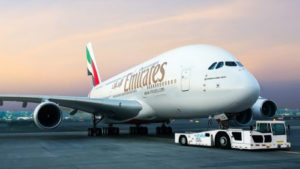Group revenue of AED 35.6 billion (US$ 9.7 billion) impacted by worldwide travel restrictions and border closures during the entire financial year
The Emirates Group recently announced its first year of loss in over 30 years caused by a significant drop in revenue, fully attributed to the impact of Covid-19 related flight and travel restrictions throughout its entire financial year 2020-21.

Released today in its 2020-21 Annual Report, the Emirates Group posted a loss of AED 22.1bn (US$ 6.0bn) for the financial year ended 31 March 2021 compared with an AED 1.7bn (US$ 456mn) profit for last year.
“In 2020-21, Emirates and dnata were hit hard by the drop in demand for international air travel as countries closed their borders and imposed stringent travel restrictions,” affirmed HH Sheikh Ahmed Bin Saeed Al Maktoum, Chairman and Chief Executive, Emirates Airline and Group.
Emirates’ total passenger and cargo capacity declined by 58% to 24.8bn ATKMs at the end of 2020-21, due to pandemic related flight and travel restrictions including a complete suspension of commercial passenger services for nearly eight weeks as directed by the UAE government from 25 March 2020.
Total operating costs decreased by 46% from last financial year. Cost of ownership (depreciation and amortisation) and employee cost were the two biggest cost components for the airline in 2020-21, followed by fuel, which accounted for 14% of operating costs compared to 31% in 2019-20.
Emirates SkyCargo
Emirates SkyCargo put in a stellar performance by rapidly responding to new demand in a changed global marketplace, contributing to 60% of the airline’s total transport revenue.
Emirates SkyCargo quickly scaled up operations and rebuilt its cargo network to meet strong demand from shippers who faced a capacity crunch when the pandemic forced airlines to drastically reduce flights.
In addition to supporting global supply chains for food, medical and other trade items, Emirates SkyCargo also tapped on its pharma capabilities and infrastructure to support the worldwide distribution of Covid-19 vaccines and humanitarian relief to Lebanon in the aftermath of the Port of Beirut explosions.
In October, Emirates SkyCargo set up a dedicated GDP-certified airside hub in Dubai for Covid-19 vaccines, and later it partnered with UNICEF to facilitate the rapid transport of vaccines to developing nations through Dubai.
With the strong demand in air freight throughout the year, Emirates’ cargo division reported a revenue of AED 17.1bn (US$ 4.7bn), an increase of 53% over last year.
Freight yield per Freight Tonne Kilometre (FTKM) increased strongly by 88%, due to the unique pandemic situation which led to significantly reduced cargo capacity in the market worldwide.
Tonnage carried decreased by 22% to reach 1.9mn tonnes, due to the reduced available bellyhold capacity for the entire year. At the end of 2020-21, Emirates’ SkyCargo’s total freighter fleet stood unchanged at 11 Boeing 777Fs.
